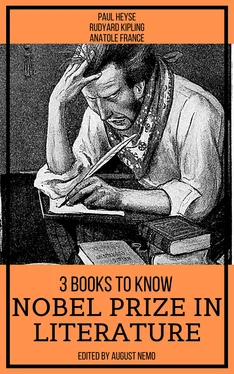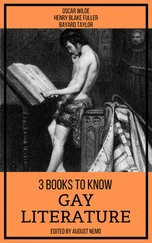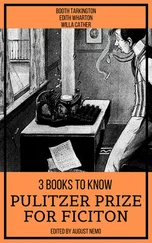"Thank you, Reginchen. I am used to it. You are always so kind. Why have you dressed so early to-day, Reginchen?"
The young girl blushed as she smoothed her little black silk apron and the folds of a light muslin that had been freshly washed and ironed.
"This is my birthday, Herr Walter," (she could not accustom herself to the name of "Balder.") "My mother gave me the apron, and the old gentleman on the second floor, the garnet breastpin. I am going to visit my aunt at Schöneberg after dinner, and so I wanted to ask if I might bring your dinner up very early to-day. My brother will come for me punctually at one o'clock."
"Your birthday, Reginchen! And I have forgotten it! Are you angry with me? My brother's sickness has given me so much to think of lately. You know, Reginchen, I wish you all possible good fortune and happiness, though my congratulations are late; but you are used to seeing me limp."
"How can you talk so. Herr Walter?" she replied, quietly allowing the firm little hand he had so cordially grasped to rest in his. "It makes no difference whether a stupid thing like me, without education or culture, is seventeen or eighteen. Father says women remain great children all their lives; so whether they become older or not can be of little consequence."
"He is only joking, Reginchen. What would your father do without you, to say nothing of the rest of us in the house? So you are really eighteen years old to-day? I wish I knew of something that would give you pleasure; I should like to make you a birthday present."
"I don't want any present," she replied, hastily turning away and putting her foot on the upper stair. "I have already had so many gifts from you at Christmas and such times, and my mother always scolds and says I am too large to receive presents from strange gentlemen. Hark! she is calling me; I must go, Herr Walter."
She darted down the steep staircase, like an arrow, and Balder, who remained at the top, heard her singing a song in a clear, childish voice, as she skipped across the pavement of the courtyard in her little slippers. As he took the waiter from the low attic stairs where she had placed it, and limped softly back into the room, he involuntarily sighed.
Going up to his sleeping brother he gazed at him with affectionate anxiety. Edwin seemed to be slumbering quietly. His high, beautifully arched brow was unwrinkled, a smile played around his lips, and his delicate nostrils quivered slightly, as they always did when he made a witty speech. His shirt was open at the throat, and a small gold locket attached to a silk cord and containing a tress of his mother's golden hair, was plainly visible. Balder wore one like it.
He was about to retire to the window corner again, when a hasty step was heard on the stairs, and ere Balder could reach the door to stop the new comer, an eager knock announced a visitor who knew himself to be welcome at any hour.
"Come in!" said Edwin, as he slowly rose from his pillow, still half asleep. "That must be Marquard. Good heavens, it is broad daylight!"
"To be sure!" laughed the new arrival. "It requires the presence of a despicable empiric like myself, to make the Herr Philosopher aware that the sun is several hours high in the heavens. Well, how are you, patient? Has the prescription wrought its work? I am almost inclined to believe that the dose was too strong."
Nodding kindly to Balder, he hastily approached the bed and touched Edwin's brow and temples before feeling his pulse. The keen, light gray eyes gazed through a pair of gold-rimmed spectacles at a heavy gold watch, and the youthfully round and regular, though somewhat pale face, which on entering the door had worn an expression of the gayest unconcern, now assumed a quiet, watchful air, while the elegant figure, which was of about the medium height, leaned lightly on a chair beside the bed.
"My dear Herr Medicinalrath," said Edwin, "your master work has been performed on me. Mother Nature, who may well fear you since you irreverently pry into her most sacred secrets and scan all her little weaknesses as through a microscope, seems, at your command, to have once more taken pity upon me, and granted me sleep. All else will follow as a matter of course; at least I already feel a truly wolfish appetite. If you'll allow me. Doctor, I'll only put on the most necessary articles of clothing, and go to breakfast at once, to relieve Balder, who I see has again waited for me."
"Probatum est," laughed the doctor, pocketing his watch. "I was perfectly well aware, that for brains like yours, there is no better narcotic than the mixture of folly, noise, and tights, we men of the world swallow to excite us. I find your symptoms to-day far more encouraging than yesterday, and, within a few days, I think I shall repeat the dose. Hunger is a good symptom. But I don't see the breakfast."
"It is standing on the table yonder," said Balder, quietly.
The doctor stepped to the little table, which, covered with a green cloth, stood in the middle of the room, and gazed, with an indescribable look of pity and horror, at the white pitcher, which stood between two stoneware cups, while a tin plate beside it contained two small rolls.
"Pardon me," said he, "my science does not extend so far as to enable me to determine, by its mere appearance, the name of the strong broth which awaits you here as your first meal."
"It is pure, unadulterated milk, in which we dip the flower of wheat," said Edwin, who, having in the meantime hastily clothed himself, now approached the table and filled both cups. "You are doubtless aware, my dear fellow, that milk contains all the elements of nourishment which—"
"Which a child in swaddling clothes needs till it cuts its teeth! Sacred Reason, what is the world coming to, when your ablest votaries, the philosophers, confess themselves addicted to the most preposterous habits and customs. Are you not startled, my lad, by the frightful contradiction involved by your endeavor, amidst our exhaustive, enervating civilization, which constitutes such a drain upon the blood and marrow, to sustain yourself on the nourishment of stupid pastoral tribes? In Berlin, too, where as you know, all the cows are infected with the pallor of the Hegel philosophy, and where the watery fluid they give is still further diluted at every pump. No, my dear fellow, either I give you up as incurable, or you must decide at once upon a radical change of habit, wash your face with this innocent fluid—an admirable preventive of premature wrinkles—and moisten your inner man at this time with a glass of port wine, to be followed by the consumption of half a pound of roast meat. I'll wager that in a short time there will be a change in your organism which will make itself perceptibly felt if you visit the Berlin ballet too frequently. What are you laughing at? I am perfectly serious."
"That is just why I laughed," said Edwin, as, standing by the table, he quietly broke his roll into the thin blue milk. "You forget, my dear fellow, that I can only make use of prescriptions which are put up at the pharmacy 'for lucky beggars.' Or do you happen to have it in your pocket?"
"What?"
"My professorship, or Balder's diploma as turner to the court. With your practice in such circles, you can not fail, if you are in earnest, to help us to a brilliant career. But until then I deeply regret that I can give you no prospect of a change of diet."
Marquard looked around the room, and shook his head angrily, as he said: "But it is suicidal folly, absurd nonsense, to live as you do! Balder, too, will never fare any better, so long as you squat here like two old women, and fast till you are livid for lack of blood. Professorship? Nonsense! With your views, you'll never get one to the end of your days in our Christian German government. If you had only learned some commonplace thing, so that you might be made useful somewhere. However, you know something of arithmetic, don't you?"
Читать дальше












